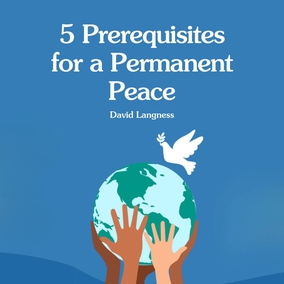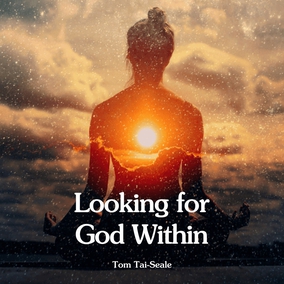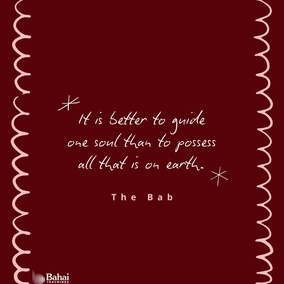The views expressed in our content reflect individual perspectives and do not represent the authoritative views of the Baha'i Faith.
During the end of my high school career and the beginning of college, the heart of my intellectual and spiritual life focused on a new experiment—to see if I could prove or disprove the Baha’i principles.
If religious proselytes came to the door, I invited them in to see if they could refute this concept or offer something better. I did the same with the various ministers associated with St. Mark Methodist Church. My discussions with my fellow high school students all centered on Baha’i ideas and principles.
When I got to Vanderbilt the following year, I continued my quest. In my history seminar I wrote my report on the Baha’i theory of history. In my literature class, I wrote a paper comparing the cynical and frightening image in Yeats’ “The Second Coming” with the Baha’i notion of the Second Coming and the End Days as something propitious—as a coming of age of humankind as opposed to any concept of the End of Time. With my friends and companions I would do the same, not to teach or preach or vindicate, but to probe, to test, to challenge the Baha’i theory of reality.
The more I pursued this goal, the more I became personally invested in the answer for one very obvious reason. I knew if this theory of reality was correct, I could hardly reject it. I could not simply acknowledge its validity without become involved in the course of action it offered as a means for bringing about the divine intentions God had devised for the age in which I lived.
On the other hand, if I found some logical flaw or some misrepresentation in the Baha’i religion in either its theories or in its practices, I would naturally be obliged to help my brother discover the error in this path he had chosen for his own.
The Baha’i texts in the original Persian often use the word mizan. I most often associate it with a talk by Abdu’l-Baha, in his reference to the standard or measure against which we can gauge our own character and progress. Mizan refers to a “balance,” as in balance scales, the sort of scales where one puts an amount of something on one side and offsets that with precise weights on the other. Once the scales are even, once balance is attained, we merely add up the weights to see how much stuff we have, be it gold or goulash.

Metaphorically the term “balance” or mizan alludes to the standard by which we weigh or evaluate ourselves or our performance. Prior to Copernicus, all observations of the movement of heavenly spheres were weighed against the accepted standard established by Ptolemy—the scientific mizan of the time. Quite obviously the accuracy of a “balance” or “standard” is predicated on the extent to which the mizan itself complies with reality. In time it was discovered that Ptolemy’s geocentric standard had serious flaws—which meant that most calculations based on that mizan were likewise inaccurate.
It is really quite a puzzler if you think about it—if you buy a set of scales and the appropriate set of weights, it is easy enough to “zero out” the scales, to make them balanced, but how can you be sure the weights you purchased from the weight store actually weigh what they indicate? Who measured them? If they were made in a factory, how can we be sure the factory machines are not slightly defective? As the ancient Roman satirist Juvenal queried, who will judge the judges? Who weighs the weights at the weight factory? And if someone checks them periodically, how do we know they have accurate weights?
On the religious train, the tradition I was raised in, no such question arose. The train was its own reason for being. We did not weigh the decision about where we were being taken or whether or not it was wise to go there because we were never made aware that we could or should pose such questions. This normative train was particularly impervious to questions. Religion was more or less a name we bore, an organization to which we belonged, very much like a fraternity of similarly inclined individuals. Our religious affiliation might come up in conversations, but for most people on the train, it was not the organizing principle of their daily lives, nor was it intended to be. Religion ministered to the inner Sunday self. Rules of commerce and high finance governed the real world.
But increasingly, after leaving the prescribed social order of the fraternity system, I began weighing the rest of my reality, using the mizan of the Baha’i teachings as my standard. I did so because what it proposed to me was the possibility of a fully integrated way of life in which everything I aspired to or did could be coordinated and evaluated by a single inclusive and coherent perspective, a world view that was at once personal and yet entirely pervasive. Like a unified field theory of metaphysics, it struck the balance between science and religion, between the mind and the spirit:
Consider what it is that singles man out from among created beings, and makes of him a creature apart. Is it not his reasoning power, his intelligence? Shall he not make use of these in his study of religion? I say unto you: weigh carefully in the balance of reason and science everything that is presented to you as religion. If it passes this test, then accept it, for it is truth! If, however, it does not so conform, then reject it, for it is ignorance!
Look around and see how the world of today is drowned in superstition and outward forms!
…It is impossible for religion to be contrary to science, even though some intellects are too weak or too immature to understand truth.
God made religion and science to be the measure, as it were, of our understanding. Take heed that you neglect not such a wonderful power. Weigh all things in this balance. – Abdu’l-Baha, Paris Talks, p. 144-146.
Next: Meeting the Holy Manifestations of God
















Comments
Sign in or create an account
Continue with Googleor